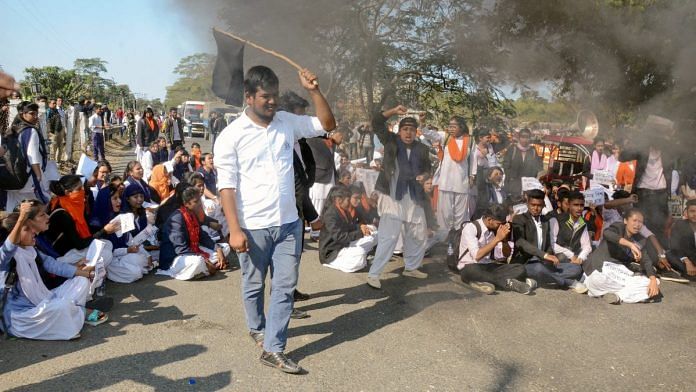BJP has been at the receiving end of a lot of flak for its decision to grant citizenship to non-Muslim refugees from Bangladesh, Pakistan and Afghanistan.
New Delhi: When the Centre announced a constitutional amendment last week that would increase the executive and financial powers of the 10 autonomous councils across four states in the northeast, the decision was perceived as a move to counter the anger in the region over the Citizenship (Amendment) Bill.
What are these autonomous councils? What is the politics behind the BJP-led government’s move? ThePrint explains.
Autonomous councils
The autonomous councils have been established in areas of Assam, Meghalaya, Tripura and Mizoram.
The Constitution of India makes special provisions for the administration of tribal-dominated areas in these states. Under Article 244 and the Sixth Schedule, these areas are called “Tribal Areas”, technically different from the ‘Scheduled Areas’ outlined by the Fifth Schedule.
The aim is to decentralise governance and grant greater autonomy to these tribal-inhabited regions.
Assam, Meghalaya and Mizoram have three autonomous district councils each, while Tripura has one.
While these areas remain within the executive authority of the state government, district councils and regional councils can be created to exercise certain legislative and judicial powers.
The composition of these councils as well as their powers are clearly laid down in the Constitution.
The district council shall “consist of not more than thirty members, of whom not more than four persons shall be nominated by the Governor and the rest shall be elected on the basis of adult suffrage”.
The first Chief Minister of Assam, Gopinath Bordoloi (1946-1950) played a key role in recommending the setting up of autonomous district councils.
Also read: Citizenship Amendment Bill: Atoning for Partition or religion a criterion in secular India?
Recent decisions
The government’s decision to further empower these councils mandates the Finance Commission to recommend a devolution of financial resources to them. This will increase the funds available to these councils.
Thirty additional subjects — including key departments like public works, health and family welfare as well as urban development — will be transferred to Karbi Anglong Autonomous Territorial Council and Dima Hasao Autonomous Territorial Council in Assam.
The proposed amendment also provides for elected village municipal councils — traditionally, village chieftains have headed the village councils. There will be reservation for women in at least one-third of the seats in the village and municipal councils in parts of Assam, Mizoram and Tripura.
A bill to this effect is expected to be brought to Parliament in the forthcoming Budget Session.
The political backdrop
BJP governments rule all seven northeastern states, alone or in an alliance. The party
has aggressively championed the Citizenship (Amendment) Bill, and got it passed by Lok Sabha during the last session.
That Bill will grant citizenship to refugees from Bangladesh, Pakistan and Afghanistan who are Hindu, Sikh, Buddhist, Jain, Parsi and Christian. This is a parallel exercise to the National Register of Citizens (NRC) update in Assam that aims to identify illegal Bangladeshi immigrants.
In Assam and the other states, the Citizenship (Amendment) Bill has met with public opposition as the ethnic population feels it ignores the sentiment and interests of the indigenous people.
The argument goes that the Bill will dilute the demographic profile of these states, particularly in Assam, and further eat into their share of the limited resources, and state benefits.
The BJP’s state units in Assam, Manipur and Arunachal Pradesh have also resisted the move, and so have its allies.
By empowering the autonomous councils, the BJP hopes to endear itself to the crucial tribal population of these states, with approximately 1 crore tribals expected to benefit.
Politically, neither the opposition parties nor the BJP’s allies would benefit from opposing more power to the councils.
In fact, the Indigenous People’s Front of Tripura (IPFT), a BJP ally, has welcomed the move, just days after it said it would ask the Centre to not bring in the Citizenship (Amendment) Bill.
Also read: For 2019 elections, BJP at least needs the Citizenship Amendment Bill



